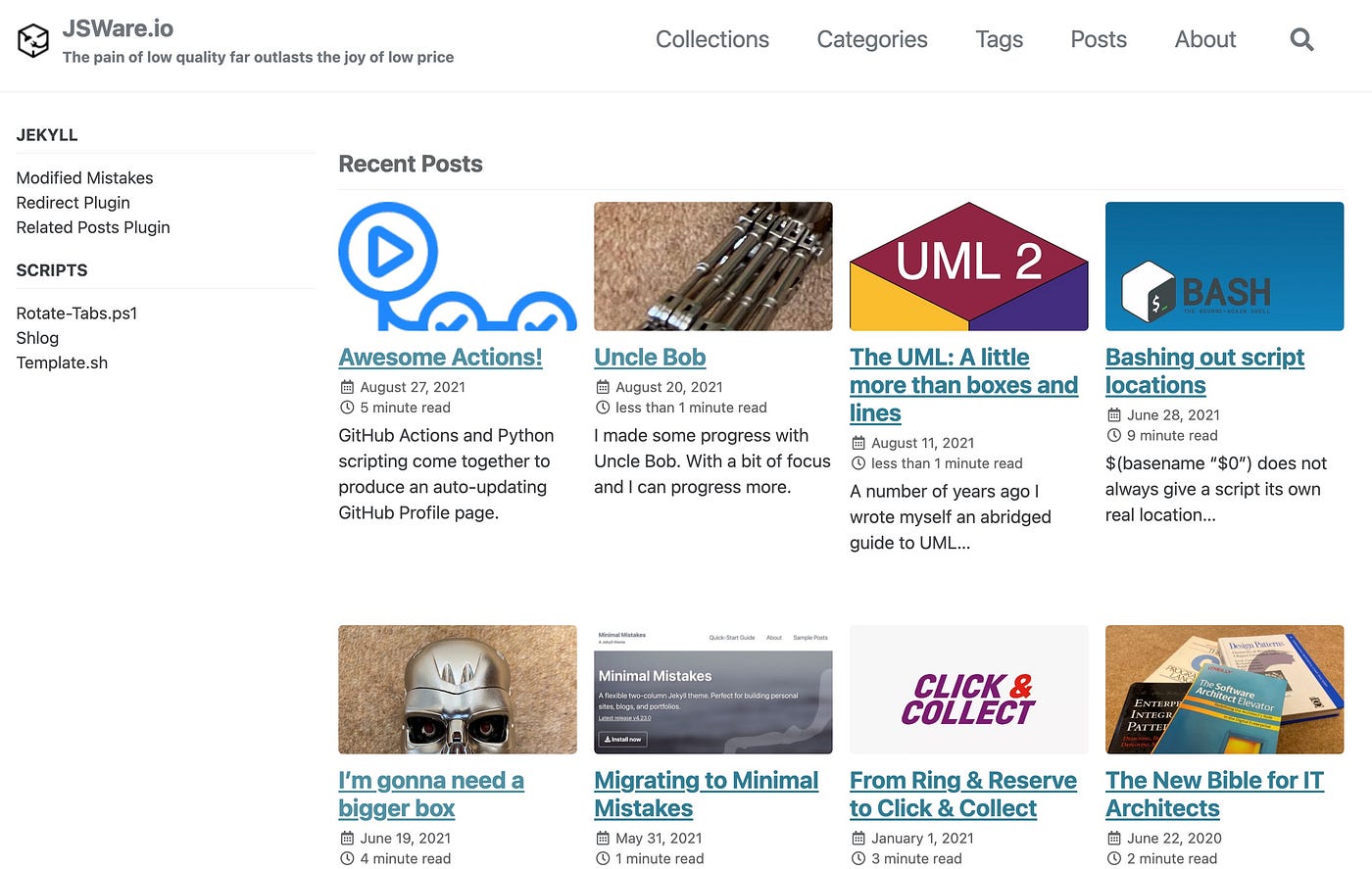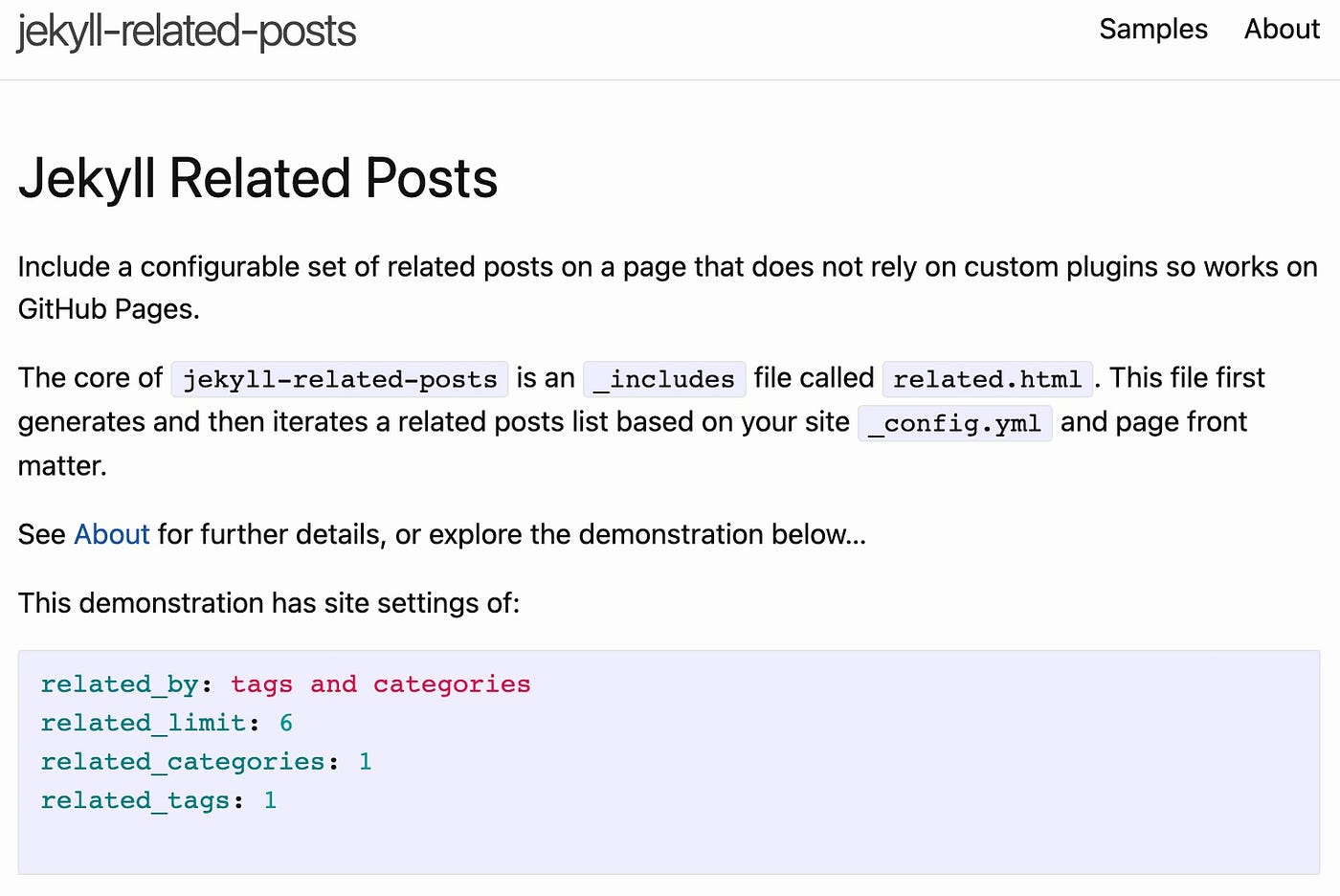I have been using GitHub Pages to build this site (https://www.jsware.io) of posts and collections of other pages on subjects that interest me.

The process for setting up a GitHub Pages site is relatively straightforward. You can even setup a custom domain name (as I have done) if you wish — all for free!
GitHub Pages uses Jekyll — a simple, blog-aware static static site generator. Jekyll uses a combination of markdown, the Shopify Liquid templating language and HTML to produce static web sites.
To publish a GitHub Pages site, create a GitHub repository called username.github.io (where username is your GitHub username, or organisation name), clone the repository, commit some files and push those changes. Within a few minutes a site appears at https://username.github.io. Voila!
With Jekyll and free themes such as the popular Minimal Mistakes theme (understandable considering it’s excellent quality), sophisticated static sites can be created.
Jekyll has the concept of posts, pages and collections of documents. For posts, Jekyll makes a list of related posts available. If you have used Jekyll before, they can be found in the Jekyll variable site.related_posts. There is an option to build high quality related posts (using the --lsi option) but this is not available on GitHub pages.
For posts, Jekyll sets the site.related_posts variable to an array of the 10 most recent posts by default. For other pages and collections, site.related_posts is empty.
There are some Jekyll plugins around that might produce better related posts, but GitHub Pages runs the jeykll site builder in --safe mode which disables custom plugins (for security reasons). GitHub Pages supports a number of standard plugins, but a better related posts one is not among them.
You are stuck with the 10 most recent posts on GitHub Pages — and only on posts. No related posts for pages in collections.
I wasn’t happy with the default site.related_posts list. Showing the 10 most recent posts only for posts, not other documents is a limitation I wanted to be free from.
I decided to write a jekyll-related-posts layout that processed posts and pages for the site, matching based on tags and categories which can be assigned manually to each page based on your content. Ultimately it became an include file used at the appropriate point in your page layouts.
The https://www.jsware.io/jekyll-related-posts include file was born.

Now you can include a configurable set of related posts on a page without relying on custom plugins, so works with GitHub Pages.
- Choose random pages from posts and collections.
- Choose pages with matching tags and/or categories.
- Change the number of related pages to include.
- Change the selection criteria (number of tags/categories, match both tags and categories or either).
- Choose random posts from the matched pages.
The core of jekyll-related-posts is an _includes file called related.html. This file first generates and then iterates a related posts list based on your site _config.yml and page front matter.
Installation
- Copy the
related.htmlfile into your site_includesdirectory. - Modify your
_config.ymlfile to includerelated_by,related_categoriesand/orrelated_tagsvalues. See below for available settings. - Update the
_layoutused to include related posts to{% include related.html %}where related posts should appear. - Copy the
related-post.htmlfile into your _includes directory - modifying it to output a link for each related document. Alternatively set therelated_templatesetting in_config.ymlwith an alternative include file - for examplearchive-single.htmlif you use the Minimal Mistakes theme.
Settings
The configured related_template file (defaults to related-post.html) is included by related.html for each post (as a post variable). Additionally, a related_layout value is provided in include.type to control how that related post is shown on your page. This is compatible with the popular Minimal Mistakes’ Grid View layout in it’s archive-single helper.
Configuration for related.html is controlled by a set of related_* settings. They can be set at the page level, which overrides a site-wide setting. Each setting has a default value if not set at page or site levels:
page.related_*? => Use page.related_*
|
No
|
\-- site.related_*? => Use site.related_*
|
No
|
\-- Use a default value.
The following related_* variables are available:
| Related Setting | Description |
|---|---|
related_by | Space separated list defining how related posts are selected. Use tags, categories (or both separated by space to match tags and categories). Include the word or to match tags or categories.Alternatively use random to choose a random set of pages, or default for site.related_posts (or site.posts if site.related_posts is empty). |
related_from | Specify whether related pages come from just posts, the same collection or any documents (including posts).NB: When using related_by: random, pages can only be selected from all posts or all documents (including posts). To select random pages from the same collection see the examples below. |
related_limit | The maximum number of related pages to include. Defaults to 4. |
related_categories | The minimum number of matching categories when related_by contains categories. Defaults to 1. |
related_tags | The minimum number of matching tags when related_by contains tags. Defaults to 1. |
related_template | The name of the _include file used for each related post added to the page. Defaults to related-post.html For the Minimal Mistakes theme, use archive-single.html instead. |
related_layout | The layout to pass to the related_template in the include.type parameter. Can vary depending on the related_template used. Defaults to list. |
NB: Setting related_categories and related_tags to 0 when using related_by = categories, tags or both has a similar effect to configuring related_by as random.
Example Configurations
Example configurations and integration of related.html into the default layout of the Jekyll minima theme is shown below:
Include up to 6 pages with 1+ matching categories AND 1+ matching tags:
related_by: tags categories # Match on both categories and tags
related_limit: 6 # Include 6 related pages
related_categories: 1 # Match at least 1 category
related_tags: 1 # AND at least 1 tag.
Include up to 4 pages with 1+ matching categories OR 1+ matching tags:
related_by: tags or categories # Match on categories OR tags
#related_limit: 4 # Include 4 related pages by default
related_categories: 1 # Match at least 1 category
related_tags: 2 # OR at least 2 tags.
NB: related_limit: 4 is the default value, so does not have to be specified.
Include up to 5 related pages with 2+ matching tags:
related_by: tags # Match on both categories and tags
related_limit: 5 # Include 5 related pages
related_tags: 2 # Match with at least 2 tags.
Integrating related.html into a layout
Integrating related.html into the default layout can be as simple as:
{% comment %}
<!-- Only show related pages on a page when `related: true` -->
{% endcomment %}
{% if page.id and page.related %}
<div class="wrapper">
<h3>See also</h3>
{% include related.html %}
</div>
{% endif %}
Random Related Pages
The example front matter below will choose 10 random pages across posts and other collections. For example, on a recipe site, you could have a page that just shows random recipies from across your collections and posts.
---
title: "Random Recipes"
related_by: random
related_limit: 10
---
Random from the same collection:
To select random pages from the same collection, you cannot specify related_by: random along with related_from: collection. Instead relate by 0+ matching tags (i.e. any page from the same collection):
related_by: tags # Match on just tags
related_from: collection # Select from the same collection
related_tags: 0 # Match any page from the collection.
NB: Related posts are chosen randomly at site build time (Jekyll is a static site generator after all). Related pages do not change when the page is accessed, only when the site is built.




Comments